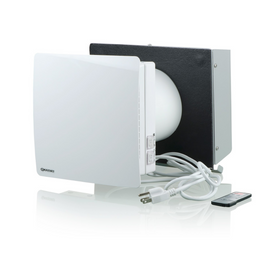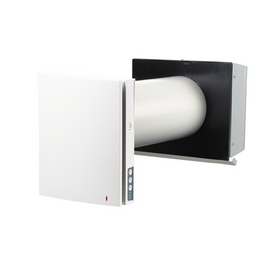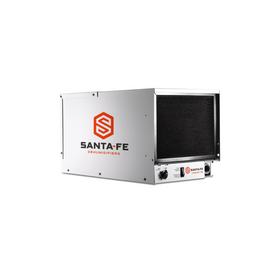
Keep Your Home Cool During The Summer - 5 Tips
Last Updated: Feb 26, 2025When the temperature outside hits triple digits, as it's doing across much of North America right now, it can be tempting to simply close the windows and crank up the air conditioner to get your home to a comfortable 65 degrees. Unfortunately, air conditioning comes with high electricity costs. And, depending on your local grid, it could be having a significant carbon impact. According to the EIA, air conditioning accounts for roughly 12 percent of household energy usage.
Summer heatwaves are expected to increase in frequency and extremity. So, finding ways to keep your home cool without depending on energy-intensive HVAC systems will be a central tenet of a sustainable home.
Table of Contents
- Manage the Light Entering Your Home
- Can You Reduce Heat Gain Through Windows?
- Strategic Use of Fans
- Limit the Use of Appliances That Produce Heat
- Can You Control Home Humidity in the Summer?
- Sleeping Strategies
- When You Need Your Air Conditioner

Manage the Light Entering Your Home
When sunlight shines through your windows, it increases the amount of heat that builds up inside your house. While you could opt for a windowless home, most of us are not up for living underground. Fortunately, there are strategies to manage the light entering your home thus helping to keep your home from heating up.

Can You Reduce Heat Gain Through Windows?
On hot summer days, shutting the windows and curtains or blinds will help keep the heat out. It is estimated that up to 30 percent of unwanted heat inside a home comes from windows that make your home operate like a greenhouse. If you spend large amounts of time away from your home, you can program smart blinds to open and close during certain hours of the day. The early morning and late evening light will most likely not bring excess heat. So, at those times, you can open the windows and curtains to provide for a cool breeze with natural ventilation.
Another strategy to manage the light (and thus heat) entering your home is through strategic landscaping. Planting deciduous trees and bushes on the south and west sides of your home will shade out much of the hot summer sun that enters through those windows. Since deciduous trees lose their leaves in the winter, they will subsequently allow sunlight to enter those same windows during the wintertime, when extra heat is needed. In addition, long overhangs on roofs above sun-prone windows will help to limit the amount of hot sunlight entering your home while still providing for natural lighting.

Strategic Use of Fans
Ceiling fans can help to create a downdraft that will circulate air in the home. The air movement will evaporate moisture on the surface of your skin, creating a natural cooling effect. Since ceiling fans only cool people (and not entire rooms since they don't produce any cool air), you should be sure to turn them off when the room is left unoccupied. Better yet, motion detector ceiling fans can be programmed to automatically turn on when they detect human presence in a room.
What most homeowners don't realize, however, is that ceiling fans need to be adjusted depending on the season. During the summertime, you will want to change the direction of your ceiling fan so that it runs counter-clockwise at the highest possible speed. This switch will create a natural breeze to lower the temperature in the room.
For those super-hot dog days of summer, consider placing a bowl with ice (or perhaps a large pitcher of iced lemonade) in front of a table fan. The air movement produced by the fan will pass alongside the frozen or icy bowl or pitcher and offer a fresh, almost chilled breeze that will quickly cool you down.

Can You Control Home Humidity in the Summer?
High humidity levels inside the home will only increase the feeling of uncomfortable heat. An ENERGY STAR® qualified dehumidifier can help to keep things more comfortable on really humid days. Portable dehumidifiers are ideal for addressing minor moisture problems. Still, they are not an alternative for proper ventilation, like energy-recovery ventilators common in well-sealed, modern homes. When doing activities that produce moisture and heat, such as cooking, showering, washing, or running the dishwasher, always use exhaust fans or open the windows. Let the exhaust fan run for about 10 min after showering.
Ventilation & Air
Find a wide variety of researched and vetted home improvement products that help address your home's ventilation and air quality needs.

Vents TwinFresh Comfo RA1-50-2 Ductless Energy Recovery Ventilator
Vents
In Stock

Vents TwinFresh Expert RA1-50-2 Ductless Energy Recovery Ventilator
Vents
In Stock

Santa Fe Compact70 A2L Dehumidifier
Santa Fe
In Stock

Santa Fe UltraMD33 A2L In-Wall Dehumidifier
Santa Fe
In Stock

Innovative Dehumidifier IW25-5 In-Wall Dehumidifier
Innovative Dehumidifier
In Stock

AlorAir Sentinel HD55 Blue 113 Pint Commercial-Residential Dehumidifier
AlorAir
In Stock

Innovative Dehumidifier Condensate Pump for IW25-5 In-Wall Dehumidifier
Innovative Dehumidifier
In Stock

Vents Solar Powered Ductless Fresh Air Wall Vent PSS 102
Vents
In Stock

Vents TwinFresh Expert RW1-85-2 V.2 Ductless Energy Recovery Ventilator
Vents
In Stock

Santa Fe Small Hanging Kit
Santa Fe
In Stock

Sleeping Strategies
When people are away from their homes during the hottest hours of the day, it has time to gather heat and will most likely be hot and stuffy during the nighttime as well. If the temperature in your area does get significantly cooler in the evenings, simply opening your windows should cool your house down to a comfortable temperature.
If, however, you live in an area where nighttime temperatures are still uncomfortably hot, you might consider switching to a buckwheat pillow and cotton sheets. Cotton naturally breathes and will keep you cooler. Buckwheat pillows have small spaces between the individual hulls, allowing for better airflow and not holding your body heat.
Of course, hot air rises, so if nothing else works, consider sleeping on the couch in the basement of your home or putting your mattress directly onto the floor.

When You Need Your Air Conditioner
For those heat waves when 95-degree temperatures can feel like a cool down, you'll want to make use of your air conditioner to cool the indoor air. For the most efficient use of your air conditioning unit, make sure the vents are not blocked with drapes or furniture. In addition, the outside unit will need to be cleaned periodically of leaves and other debris. And of course, setting the thermostat at the higher end of the range will lower air-conditioning costs and energy usage.
Tobias Roberts
Tobias runs an agroecology farm and a natural building collective in the mountains of El Salvador. He specializes in earthen construction methods and uses permaculture design methods to integrate structures into the sustainability of the landscape.

